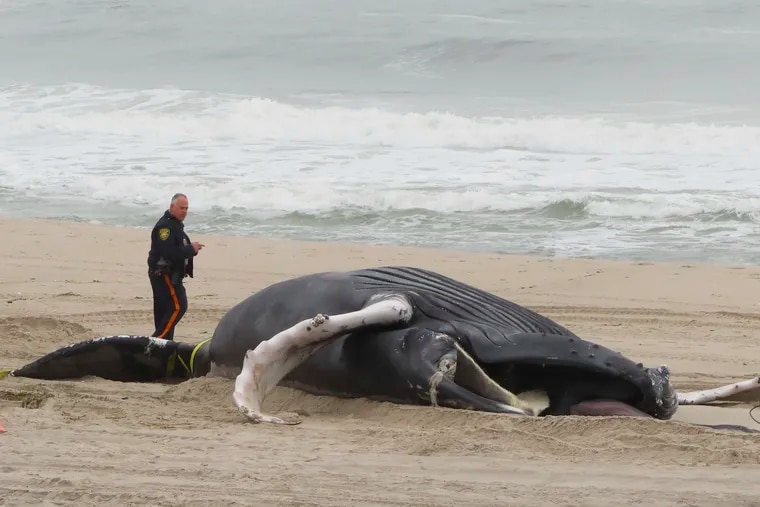Highlights: Residents who live along New Jersey’s thriving coast had genuine concerns about the impact of offshore wind on their ocean views, local economies, and commercial and recreational fishing.
But an unusual event gave fossil fuel-aligned interests an opening to dominate the conversation, ultimately helping sway public opinion away from offshore wind: a spate of whale deaths.
Starting in 2016, humpback whales started to become stranded at an elevated rate along the Atlantic Coast from Maine through Florida. In 2023 alone, eight humpback whales were stranded in New Jersey, bringing the total from 2016 through October to 29 in what the National Ocean and Atmospheric Administration Fisheries called an “unusual mortality event.”
The unusual mortality event began before offshore wind projects were approved in New Jersey. Orsted’s Ocean Wind 1 project got the go-ahead in June 2019, but it has never begun construction.
Regardless, the whale deaths began making national news this year.
Most whale deaths go unrecorded, as do causes. But NOAA says a portion of the whales have shown evidence of being struck by vessels. Others get entangled in fishing equipment. However, NOAA said it does not have enough evidence to conclude all whales were stranded or killed in those ways and that more research is needed.
Regardless, anti-wind groups began suggesting survey vessels used by the offshore wind industry interfered with whale movements because of sonar — even though sonar has been widely used by other industries including fishing. Cable news, talk radio, and social media helped spread the word.
The claims captured the public’s attention. Protect Our Coast NJ, one of the most outspoken anti-wind groups, raised donations for the Ocean Environment Legal Defense Fund through its Facebook group and a web page. The fund is administered by the Caesar Rodney Institute, a Delaware based group that originated as a conservative nonprofit, but now bills itself as nonpartisan. Protect Our Coast NJ said the institute has no role other than to hold the group’s money.
The Heartland Institute, a “free-market” think tank, has also been involved in tying offshore wind to North Atlantic right whale deaths. It has been closely aligned with fossil fuel and conservative groups.
By September, a Stockton University poll showed that public support for wind turbines off the New Jersey coast had waned over four years, especially in Shore towns. The poll showed that 50% of state residents were still in favor of the wind farms, 33% opposed, and 16% unsure. However, the results reflected a 30 percentage-point drop in support from 2019.
The main reasons cited for opposition: potential harm to sea life and obstructed ocean views — the same claims the anti-wind groups were making.
The Save Right Whales Coalition was cofounded by Lisa Linowes, a senior fellow at the Texas Public Policy Foundation, an Austin-based conservative think tank that advocates for fossil fuels and opposes wind energy.
In its last public filing for its nonprofit status, the Texas Public Policy Foundation reported contributions of $25.6 million. The foundation is not required to disclose all its donors. But The New York Times, SourceWatch.org, a watchdog group, and others have detailed contributions from multiple fossil-fuel aligned donors including the Koch brothers, owners of Koch Industries, which owns petrochemical plants, oil refineries, and pipelines.
The Save Right Whales Coalition says on its website that it does not take money from “fossil fuel, nuclear, or any other energy industry” and that most members of the coalition are unpaid volunteers.
The one paid staff member works for the nonprofit Environmental Progress. Save Right Whales Coalition requests that donations be made to Environmental Progress, a Berkley, Calif.-based nonprofit.
Environmental Progress is run by Michael Shellenberger. The group’s website describes Shellenberger as an “environmental guru,” “climate guru,” “North America’s leading public intellectual on clean energy,” and “high priest” of the environmental humanist movement.
As president of Environmental Progress, Shellenberger is paid $225,000 a year, or about 30% of contributions the group took in 2021, according to its 990 filing with the IRS.
Shellenberger, an independent candidate for California governor, frequently tweets against wind on X, the platform formerly known as Twitter. His social media posts are largely pro-nuclear and pro-fossil fuel.


